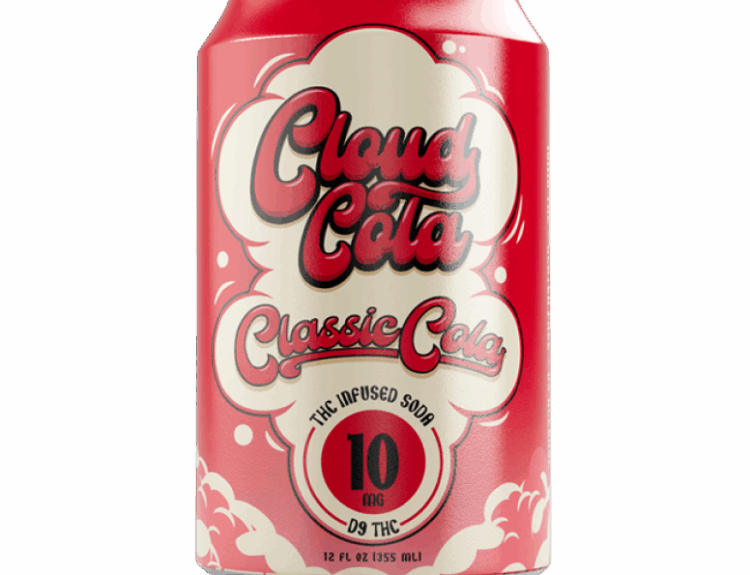The Science of THC and the Brain
THC, the psychoactive compound found in cannabis, interacts with the brain in complex ways, triggering a cascade of effects that can alter perception, mood, and cognition. Understanding how THC affects brain function is crucial for evaluating the potential benefits and risks associated with its consumption, especially in novel forms like THC-infused sodas.
THC’s Interaction with the Endocannabinoid System
THC exerts its influence by binding to cannabinoid receptors, primarily CB1 receptors, which are densely concentrated in areas of the brain associated with pleasure, memory, thinking, and coordination. This interaction disrupts the normal communication between neurons, leading to a variety of physiological and psychological effects. Activation of CB1 receptors can lead to feelings of euphoria, relaxation, and altered sensory perception. It can also impair short-term memory, attention, and decision-making.
The endocannabinoid system (ECS), a complex network of receptors and neurotransmitters found throughout the body, plays a crucial role in regulating various physiological processes, including mood, appetite, sleep, and pain perception. THC’s interaction with the ECS mimics the effects of naturally occurring endocannabinoids, such as anandamide, which bind to CB1 receptors. By influencing this intricate system, THC can produce a wide range of effects, from stress relief and pain reduction to cognitive impairment and addiction.

Impact on Neurotransmitters and Brain Function
The impact of THC on neurotransmitters is multifaceted and contributes to the diverse range of effects it produces.
- THC influences dopamine release in the brain’s reward pathway, leading to feelings of pleasure and euphoria.
- It also interacts with serotonin receptors, which are involved in mood regulation, potentially contributing to its anxiolytic (anxiety-reducing) effects in some individuals.
- THC can suppress glutamate release, a neurotransmitter essential for learning and memory, explaining its potential for cognitive impairment.
The consumption of THC-infused sodas presents unique considerations due to the rapid absorption rate of THC when consumed orally. This can lead to more intense and unpredictable effects compared to other methods of consumption, making it crucial for individuals to start with low doses and proceed cautiously.
Potential Cognitive Benefits of THC Soda
THC soda, a novel way to consume cannabis, has sparked curiosity about its potential cognitive benefits. While THC is known to interact with brain receptors involved in pleasure, memory, and thinking, the specific effects of consuming it in a beverage format are still being investigated. This exploration delves into the complex relationship between THC and brain function, examining both the possible advantages and potential drawbacks associated with THC soda consumption.
Improved Mood and Reduced Anxiety
One potential cognitive benefit of THC soda is its ability to improve mood and reduce anxiety. THC’s interaction with serotonin receptors may contribute to these effects. Serotonin is a neurotransmitter that plays a key role in regulating mood, and by influencing serotonin activity, THC could potentially alleviate symptoms of anxiety and depression.
However, it is important to note that the relationship between THC and mood is complex and can vary greatly depending on individual factors such as dosage, frequency of use, and pre-existing mental health conditions.
While some individuals may experience mood enhancement and anxiety reduction, others may experience heightened anxiety or paranoia.
Enhanced Creativity and Focus
THC soda’s impact on creativity is another area of exploration. Some proponents suggest that THC can unlock creative thinking by promoting divergent thinking, allowing for the generation of novel ideas and perspectives.
This theory stems from THC’s ability to alter neural pathways and communication in areas of the brain associated with imagination and cognitive flexibility.
However, research on this topic is still limited, and more studies are needed to definitively establish a link between THC consumption and enhanced creativity.
Focus and attention can also be influenced by THC, but the effects are often mixed.
While some users report an improved ability to concentrate on specific tasks, others experience difficulty focusing or suffer from distractibility.
The impact on attention likely depends on various factors such as dosage, individual brain chemistry, and the nature of the task being performed.

Potential Negative Effects of THC Soda on Brain Function
While THC soda offers a novel way to consume cannabis, its potential effects on brain function are complex and require careful consideration. THC’s interaction with cannabinoid receptors in the brain can lead to both beneficial and detrimental consequences for cognitive processes such as mood regulation, memory, attention, and creativity. Understanding these potential effects is crucial for individuals who choose to consume THC soda, enabling them to make informed decisions about their consumption habits.
Impaired Memory and Cognition
THC’s impact on memory and cognition can be significant and often negative. Short-term memory, particularly the ability to encode and recall recent information, is particularly vulnerable to THC’s effects. This impairment can manifest as difficulty remembering conversations, names, or appointments shortly after consuming THC.
THC’s interference with attention and executive function can also lead to problems with concentration, decision-making, and planning. Tasks that require sustained focus, multitasking, or complex problem-solving may become challenging under the influence of THC.
Furthermore, THC’s ability to disrupt neurotransmitter systems involved in learning and memory formation can have long-term consequences. Chronic THC use, especially during adolescence when the brain is still developing, has been linked to potential cognitive decline and an increased risk of cognitive impairments later in life.
Increased Risk of Addiction
While THC soda offers a novel way to consume cannabis, its potential effects on brain function are complex and require careful consideration. THC’s interaction with cannabinoid receptors in the brain can lead to both beneficial and detrimental consequences for cognitive processes such as mood regulation, memory, attention, and creativity.
However, it is important to note that THC has a potential for negative effects on brain function, particularly with regular use.
- Memory Impairment: THC can significantly impair short-term memory, making it difficult to recall recent information.
- Attention Deficit: THC’s interference with attention and executive function can lead to problems with concentration, decision-making, and planning.
- Cognitive Decline Risk: Chronic THC use, especially during adolescence, has been linked to potential cognitive decline and an increased risk of cognitive impairments later in life.
Furthermore, the rapid absorption rate of THC when consumed orally can lead to more intense and unpredictable effects compared to other methods of consumption. This heightened risk needs to be carefully considered when evaluating the potential risks associated with THC soda.
Mental Health Concerns
The rapid absorption rate of THC from sodas can lead to a faster onset and more intense effects compared to other methods of consumption, potentially increasing the risk of negative cognitive experiences.
Long-term use of THC has been linked to potential cognitive decline, especially in individuals who start using it during adolescence when the brain is still developing. The impact on the developing brain could lead to long-lasting effects on learning, memory, and executive function.
Mental health concerns can also arise from THC consumption. While THC may temporarily alleviate anxiety in some individuals, it can worsen existing anxiety or trigger panic attacks in others. In those prone to psychosis, THC use can increase the risk of experiencing psychotic symptoms like hallucinations and paranoia.
Dosage Considerations and Individual Variability
Dosage considerations are crucial when it comes to understanding the effects of THC on brain function, as individual variability in response to the drug is significant. Factors such as body weight, metabolism, tolerance level, and prior experience with cannabis can all influence how an individual reacts to a given dose of THC.
Factors Influencing THC’s Impact
Dosage considerations are crucial when it comes to understanding the effects of THC on brain function, as individual variability in response to the drug is significant. Factors such as body weight, metabolism, tolerance level, and prior experience with cannabis can all influence how an individual reacts to a given dose of THC.
- Body Weight: Individuals with higher body weight may require larger doses of THC to achieve the desired effects, while those with lower body weight may be more sensitive to even small amounts.
- Metabolism: The rate at which the body metabolizes THC can vary considerably among individuals. Those with faster metabolisms may clear THC from their system more quickly, requiring higher doses or more frequent consumption to maintain effects.
- Tolerance Level: Regular THC users tend to develop a tolerance to its effects, meaning they require higher doses to achieve the same level of intoxication. Conversely, individuals who are new to THC may experience stronger effects from even small amounts.
- Prior Experience: Previous experiences with cannabis can influence an individual’s perception and response to THC. Those who have consumed THC frequently may have a better understanding of its effects and be able to manage their dosage accordingly.
Personalized Tolerance Levels
Dosage considerations are crucial when it comes to understanding the effects of THC on brain function, as individual variability in response to the drug is significant. Factors such as body weight, metabolism, tolerance level, and prior experience with cannabis can all influence how an individual reacts to a given dose of THC.
Starting with a low dose and gradually increasing it allows individuals to gauge their personal tolerance level and minimize the risk of adverse effects. It is also important to note that the effects of THC can be unpredictable, and what might be a comfortable dose for one person may be too strong for another.
It’s crucial for individuals to listen to their bodies and adjust their dosage accordingly. If experiencing any negative side effects, it’s essential to reduce the dose or abstain from further consumption.
Order Cloud Cola marijuana soda for a great taste
- Jaw Slimming & Square Face Treatment Near Ripley, Surrey - May 26, 2025
- Skin Pen Microneedling Near Effingham, Surrey - May 19, 2025
- Weed Infused Drinks In Massachusetts MA - May 18, 2025


